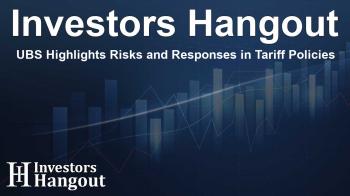UBS Highlights Risks and Responses in Tariff Policies

Potential Tariff Changes and Their Impact on Markets
Recent developments have put global markets under scrutiny. Global equities have risen as Treasury yields have seen a decline, alongside a retreating U.S. dollar in the last 24 hours. This shift aligns with reports suggesting that tariffs may be considered at a universal level, impacting critical imports only.
Understanding Tariff Dynamics
While these tariffs could encapsulate all nations, they primarily focus on vital imports. Should this policy be enacted, it may undermine a significant aspect of the previous administration’s campaign platform.
Responses from Key Players
The President-elect swiftly dismissed the report on social media, expressing frustration with how the media portrayed the situation. This rebuttal contributed to reducing the immediate pressure on the U.S. dollar and Treasury yields. Despite this denial, equity markets remained strong, with Asian stocks advancing broadly.
The Uncertain Future of Tariff Negotiations
The trajectory of tariff policy and subsequent negotiations presents challenges for the economic landscape. UBS has provided insights for investors navigating this rocky terrain. They emphasize that the negotiating posture of the U.S. may differ from actual outcomes. The President's denial reflects his strategy to maintain leverage during negotiations.
Separating Negotiation Tactics from Policy Objectives
This situation illustrates the divergence between tactical negotiations and overarching objectives. It’s essential to remember prior statements where the President suggested potential tariffs linked to non-trade matters, showcasing his intent to use tariffs as a tool for negotiation.
Risk Mitigation and Political Considerations
The economic team surrounding the President appears to grasp their mandate effectively. Despite potential pushback from the media, which may prompt hardline stances on tariffs, it remains doubtful that extreme measures would be pursued. Such actions could trigger inflation, disrupt supply chains, or contribute to more significant economic challenges.
The Republican Landscape and Midterm Strategies
Additionally, political calculations weigh heavily on this issue. With a slim majority in the House, any drastic tariff measures may threaten the Republican party's prospects in upcoming midterms. Investing in punitive measures without careful consideration could backfire, making the stakes even higher for policymakers.
Viewing the Possibility of a 'Tariff Shock'
In summary, UBS’s Marcelli mentions the possibility of a “tariff shock” bear case being minimal, but it remains a consideration for investors. As this narrative unfolds, market participants must stay vigilant about developments in tariff policy and the resulting responses from economic players. Navigating this complicated atmosphere will require acumen and foresight.
Frequently Asked Questions
What are the potential impacts of new tariffs on the economy?
New tariffs can lead to inflation, disruptions in supply chains, and potential retaliatory measures from other countries affecting global trade.
How do political dynamics affect tariff decisions?
Political considerations, such as maintaining a majority in Congress and public sentiment, heavily influence tariff policy and any potential changes.
Why is the threat of tariffs significant in negotiations?
Using tariffs as leverage in negotiations can compel other countries to make concessions, thus serving as a bargaining tool in trade discussions.
What does UBS suggest for investors regarding tariffs?
UBS advises investors to remain cautious and informed about tariff developments as they can significantly impact market conditions and economic forecasts.
Can the U.S. alter its negotiating stance on tariffs?
Yes, the U.S. could adjust its negotiating posture based on evolving economic conditions and political pressures, so flexibility is key in their strategy.
About The Author
Contact Logan Wright privately here. Or send an email with ATTN: Logan Wright as the subject to contact@investorshangout.com.
About Investors Hangout
Investors Hangout is a leading online stock forum for financial discussion and learning, offering a wide range of free tools and resources. It draws in traders of all levels, who exchange market knowledge, investigate trading tactics, and keep an eye on industry developments in real time. Featuring financial articles, stock message boards, quotes, charts, company profiles, and live news updates. Through cooperative learning and a wealth of informational resources, it helps users from novices creating their first portfolios to experts honing their techniques. Join Investors Hangout today: https://investorshangout.com/
The content of this article is based on factual, publicly available information and does not represent legal, financial, or investment advice. Investors Hangout does not offer financial advice, and the author is not a licensed financial advisor. Consult a qualified advisor before making any financial or investment decisions based on this article. This article should not be considered advice to purchase, sell, or hold any securities or other investments. If any of the material provided here is inaccurate, please contact us for corrections.

